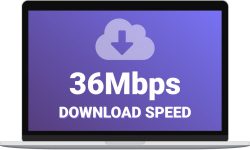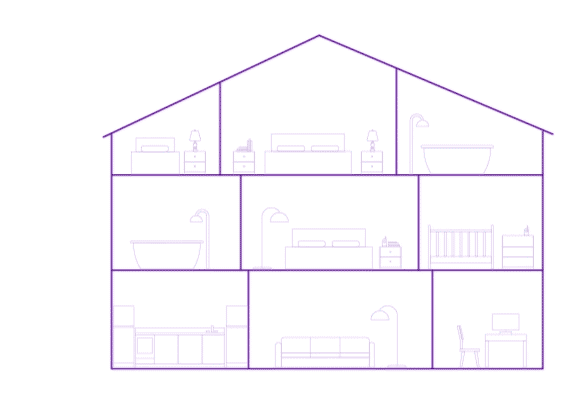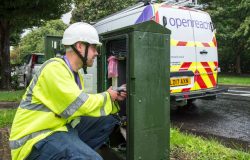A download speed of 36Mbps allows you to stream full HD video on 7 devices at the same time, or download a HD movie in 15 minutes.
 If you’re using a broadband internet connection with download speeds of 36Mbps, you can comfortably stream full HD quality video on up to 7 devices at the same time. Alternatively, you can download an entire music album in around 19 seconds or a HD-quality movie in about 15 minutes (increasing to 1 hour, 14 minutes if you’re downloading a movie in 4K ultra-HD quality).
If you’re using a broadband internet connection with download speeds of 36Mbps, you can comfortably stream full HD quality video on up to 7 devices at the same time. Alternatively, you can download an entire music album in around 19 seconds or a HD-quality movie in about 15 minutes (increasing to 1 hour, 14 minutes if you’re downloading a movie in 4K ultra-HD quality).
Several UK internet service providers have an entry-level fibre broadband plan with download speeds of around 36Mbps. Companies offering a plan in this range include BT, EE, TalkTalk and Vodafone. It's normally a little cheaper than their 67Mbps plans.
In this article, we’ll look at what you can do on a 36Mbps connection, including for online video, music, gaming, video calls and general web browsing. We’ll also look at download times on a 36Mbps connection and at how much you’ll typically need to pay for 36Mbps broadband at different ISPs.
Contents
How Fast Is 36Mbps?
 A download speed of 36Mbps is a little slower than the UK’s average home broadband service (63Mbps).
A download speed of 36Mbps is a little slower than the UK’s average home broadband service (63Mbps).
Although it's a little bit slower than average, you'll still be able to do most of the things you'd want to do online. For instance, there wouldn't be any problems with day-to-day usage such as web browsing, video calling, watching videos online or playing multiplayer games.
In some cases, things may start slowing down if you're using multiple devices at the same time (e.g. you wouldn't be able to stream ultra-HD video on multiple devices at the same time).
Streaming & Other Activities
 If you’re using a 36Mbps broadband connection, it will support most things you’d like to do online. This includes browsing the web, making video calls, listening to music and watching video online.
If you’re using a 36Mbps broadband connection, it will support most things you’d like to do online. This includes browsing the web, making video calls, listening to music and watching video online.
In the following table, we’ve listed a number of online activities and the minimum speed required for each one. We’ve also listed the number of devices you’d be able to use at the same time when accessing these services through a 36Mbps connection.
For instance, watching online video in full HD (1080p) quality would require a download speed of 5Mbps on each device. You can therefore watch on up to 7 devices at the same time if you have a 36Mbps connection.
| Activity | Required Download Speed | Usable on 36Mbps Connection? |
|---|---|---|
| Web Browsing, Messaging & E-Mail: | ||
| General web browsing | 0.1-1Mbps | ✔ Yes, on 35 devices |
| Social media, instant messaging & e-mail | <0.1Mbps | ✔ Yes, on 100+ devices |
| Voice & Video Calling: | ||
| Skype/WhatsApp phone call | 0.1Mbps | ✔ Yes, on 100+ devices |
| Skype/Zoom video call | 0.5-0.8Mbps | ✔ Yes, on 45 devices |
| Skype/Zoom video call (HD) | 1.5-1.8Mbps | ✔ Yes, on 20 devices |
| Zoom group video call (HD) | 2.5-3Mbps | ✔ Yes, on 10 devices |
| Streaming Online Music & Radio: | ||
| Listening to online radio | 0.2Mbps | ✔ Yes, on 100+ devices |
| Streaming music (Spotify, Apple Music, etc) | 0.4Mbps | ✔ Yes, on 90 devices |
| Streaming Online Video: | ||
| Watching YouTube videos (basic quality) | 0.5Mbps | ✔ Yes, on 70 devices |
| Watching YouTube videos (720p HD quality) | 2.5Mbps | ✔ Yes, on 10 devices |
| Watching YouTube videos (1080p HD quality) | 4Mbps | ✔ Yes, on 9 devices |
| Watching iPlayer/Netflix (standard definition) | 1.5Mbps | ✔ Yes, on 20 devices |
| Watching iPlayer/Netflix (high definition) | 5Mbps | ✔ Yes, on 7 devices |
| Watching iPlayer/Netflix (4K UHD) | 25Mbps | ✔ Yes, on 1 device |
| Online Gaming: | ||
| Online Gaming (installed PC/console game) | 3Mbps | ✔ Yes, on 10 devices |
| Cloud Gaming (Stadia/PS Now/Xbox Cloud) | 10Mbps | ✔ Yes, on 3 devices |
| Cloud Gaming (4K Stadia) | 35Mbps | ✔ Yes, on 1 device |
For some activities like instant messaging and email, there's no real limit to the number of devices you can use at the same time. In theory, things would still work on more than 100 devices at the same time when using a 36Mbps broadband connection. In reality, however, you might reach the limit of your home wi-fi network, which can start slowing down when you have lots of devices connected at the same time.
Download Times
 With a download speed of 36Mbps, you can download an entire music album in about 19 seconds. It will take 15 minutes to download a HD-quality film (1080p quality) and about 1 hour, 14 minutes to download an ultra-HD quality movie (4K quality).
With a download speed of 36Mbps, you can download an entire music album in about 19 seconds. It will take 15 minutes to download a HD-quality film (1080p quality) and about 1 hour, 14 minutes to download an ultra-HD quality movie (4K quality).
The following table shows the expected download time for multiple different types of file on a 36Mbps connection:
| Activity | 36Mbps Download Time |
|---|---|
| Downloading a music album: | 19 seconds |
| Downloading a 2 hour movie: | 4 minutes (SD quality) 15 minutes (HD quality) 1 hour, 14 minutes (Ultra HD quality) |
| Downloading a PC or console game: | 2 hours, 47 minutes |
| Downloading a mobile application: | 7 seconds |
| Downloading a high-quality photo: | <1 second |
| Downloading a web page or email: | <1 second |
Typical file sizes used for our calculations: 85MB for a music album, 1GB for a standard-definition movie, 4GB for a full-HD quality movie, 20GB for a 4K Ultra HD quality movie, 45GB for a PlayStation or Xbox console game, 30MB for an iPhone or Android mobile application and 2MB for a high-quality photograph.
If you’re calculating the download time for another file, it’s important to remember that 36Mbps stands for 36 Megabits per second (where 8 Megabits are equal to one MegaByte). For this reason, if you’re downloading a 36MB (36 MegaByte) file, it will take you 8 seconds to do this and not one second.
Home Network Considerations
 If your broadband connection has a 36Mbps download speed, this refers to the speed at your router or hub. This may be different from the actual speed on your individual devices.
If your broadband connection has a 36Mbps download speed, this refers to the speed at your router or hub. This may be different from the actual speed on your individual devices.
If you're connecting to the internet over wi-fi, the download speed on individual devices may be slower than 36Mbps. This is often due to poor wi-fi or congestion from other networks. This will stop you from getting the full potential of your broadband service. For instance, you might experience buffering when watching videos online due to poor wi-fi, even if your broadband connection is able to support it.
Where possible, you should use a wired Ethernet connection to get the fastest available speeds. If you're not able to do this, look at ways to improve the wi-fi signal in your home. Getting a wi-fi repeater or a mesh wi-fi system such as BT Whole Home Wi-Fi or Google Wi-Fi can be a highly effective way of improving speeds on your home wi-fi network.
How Much Does 36Mbps Broadband Cost?
 In the UK, it’s currently possible to get 36Mbps broadband with prices starting from £17.99/month. However, not all of the services are likely to be available at your address, so you’ll need to check the availability of different services at your address.
In the UK, it’s currently possible to get 36Mbps broadband with prices starting from £17.99/month. However, not all of the services are likely to be available at your address, so you’ll need to check the availability of different services at your address.
Several UK internet service providers have an entry-level fibre broadband plan with download speeds of around 36Mbps. Companies offering a plan in this range include BT, EE, TalkTalk and Vodafone. It's normally a little cheaper than their 67Mbps plans.
The following table shows 36Mbps broadband plans:
| Service | Download Speed | Monthly Cost | |
|---|---|---|---|
 Fast 30Mbps (24 months) | 30Mbps average download | £17.99 per month plus £10.00 upfront 24 month contract | See deal |
 Fibre 1 | 38Mbps average download | £24.00 per month No upfront fee 24 month contract Monthly cost rising to £27.50 on 1 Apr 2027 £31 on 1 Apr 2028 | See deal |
 Fibre Essential | 36Mbps average download | £24.99 per month No upfront fee 24 month contract Monthly cost will rise each April by £4 | See deal |
 EE Fibre 36 | 36Mbps average download | £29.99 per month No upfront fee 24 month contract Monthly cost will rise each April by £4 | See deal |
Other Download Speeds
 The cost and availability of different home broadband services depends on the download speed you’re able to get.
The cost and availability of different home broadband services depends on the download speed you’re able to get.
The following table shows how much you'd need to pay for a broadband service with different download speeds. It also shows the percentage availability amongst UK households:
| Download Speed | Monthly Price | Availability |
|---|---|---|
| 10Mbps | From £29.99/month | 98% of UK households |
| 36Mbps | From £17.99/month | 95% of UK households |
| 50Mbps | From £24.99/month | 95% of UK households |
| 67Mbps | From £22.99/month | 95% of UK households |
| 100Mbps | From £25.00/month | 60% of UK households |
| 150Mbps | From £22.99/month | 60% of UK households |
| 200Mbps | From £/month | 60% of UK households |
| 300Mbps | From £24.99/month | 60% of UK households |
| 500Mbps | From £27.00/month | 50% of UK households |
| 900Mbps | From £29.99/month | 20% of UK households |
More Information
For more information, see our in-depth guides on download speed and upload speed. You can also read our other home broadband guides, including our review of all the major UK broadband internet providers.



Geoff. D said:
How far does/can a 150 mbps. signal travel along a ‘fibre optic’ cable in 1 second (converting this to say Miles or Km per Second) ?
Everyone seems to answer ‘speed’ in relation to what you can download, whereas I am more interested in the distance the signal travels on average in a given time.
Does anyone know how to work this out ?
Ken replied:
Hi Geoff,
Thanks for your comment. Light travels at a speed of about 2.1 x 108 m/s in a fibre optic cable. However, the speed of your internet connection doesn’t really relate to this figure at all. It’s more to do with how much data can be transmitted each second which is a function of things like the hardware you’re using at each end of the cable, the plan you’re on, etc.
To illustrate, imagine if I were to transmit a message to you using a flashlight and morse code. The light would be travelling to you at the speed of light. However, you would probably only be able to receive one letter every couple of seconds, so the rate of data transfer is actually quite low (despite the speed of light being very high). We could maybe improve this (e.g. using multiple torches at the same time, using a machine at each end to send and receive the signal) but this doesn’t relate making the light travel faster.
Therefore, whether you’re using a 150Mbps connection, a 900Mbps connection, or anything else, the speed of light will remain constant across the two.
Hope this helps,
Ken
GeoffD replied:
Thank you Ken.
I was aware that I was talking about “incompatibles”, and I understand you explanation, but somewhere there must be an easy formula to calculate how quickly a given size of data (say 1Mb can be transmitted via a fibre optic cable “of a known quality” over a unit of distance (say 100 miles) given a signal rated at (say 100 Mbps) ? I tried to keep it metric. Perhaps the cable manufacturers will have worked this out ? I ask this to calculate the delay I experience when my Landline telephone (Connected via the Fibre optic cable) calls Belfast. It is clearly a different delay when I call my friend locally. Have you any further ideas/comments? Thanks GeoffD.
Ken replied:
Hi Geoff,
Thanks for the reply! Sadly, I think the delay is more related to how long it takes for the data to be processed by different servers and for it to find it’s way across the internet. Have a look at ping, latency and jitter as related concepts. So sadly, there isn’t an easy formula we can use to calculate this 🙁
Ken
Stephen replied:
Hi, I think the ‘delay’ you’re referring to is called latency. Latency is good on ADSL , fibre to the cabinet and fibre to the premises. The latter is the technology behind 500mb broadband. If you search for this or look at the ‘ping’ results from a broadband speed tester it should give an indication. hope this helps!
EdShift said:
I’m with Virgin and I’m getting a solid 10 megabytes per second download speed from Steam.
I’m connected over Wi-Fi with one range extender directly above upstairs from the router.
Very impressive.
Christopher Jesty said:
I subscribe to my service provider for a download speed of 300mbps and upload of 50mbps. In reality the download speed sometimes exceeds 300mbps however, I simply cannot watch TV channels because of severe buffering. I have an ethernet connection rom my TV box to my latest state of the art modem and my Fibre Optic replaced the old copper wire only last week. I thought that by upgrading to 300mbps all my streaming problems would be over but I am still frustrated at not being able to enjoy watching my favorite channels.
the concerned individiual replied:
Buffering over LAN can only mean one thing – congestion during times you are watching movies, either by the supplier (usually at peak time – if all the time it’s serious and should be fixed) or having 3 kids upstairs on an Xbox